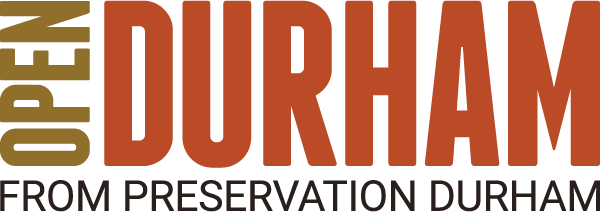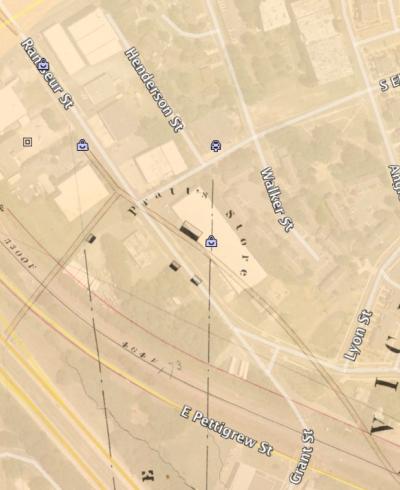One of the most interesting and colorful characters in the region during the 1800s was William N. Pratt, who owned much of the land that would later become Durham at various points throughout the 19th century.
Pratt acquired a rather disreputable reputation for the vices peddled at his establishments, although he seemed first and foremost a businessman. There, too, his reputation suffered from the story that he either set too high of a price or refused to sell his land to the North Carolian railroad - purportedly in part because it would frighten his horses. It's impossible to verify such lore, but Pratt certainly acquired a reputation as a tenacious negotiator.
Boyd, in interesting, but unfortunately unsourced history notes:
"Concerning William N. Pratt, tradition tells a little more [compared to BL Durham]. He, too was a bachelor, but his residence was not in Prattsburg. It was located on the present Club Boulevard on the site of the house occupied by George Whtted. In politics he was a Democrat; in fact, he was the political boss of the surrounding country. Regarding on of his business transactions, there is another country "yarn." It seems that before the Civil War he had noegotiations for the sale of all his property east of Church Street. The financial terms were agreed on, the prospective purchaser being a leading citizen of Durham. Then it was that Mr. Pratt added a new condition; that the purchaser must take with the land a jackass. The Durhamite dissented; but Mr. Pratt insisted and refused to give title unless he should be relieved of the care of the animal in question. The upshot was that the trade fell through. When we consider today the great value of the land extending from Church Street to East Durham, we must indeed meditate on the uncertainty of all fortunes; in this case, a lowly jackass determined destiny."
[Boyd's history breaks and stretches credulity at times such as this - the apocryphal sounding story of the jackass may be taken as harmless enough to believe or disbelieve, but he states in a more author-esque tone "the prospective purchaser being a leading citizen of Durham." Durham was so small pre-Civil War, what constituted a leading citizen?]
Pratt's early history is murky, but he at times owned both of the Hillsborough-to-Raleigh Road's most notorious pit stops: Pinhook and the eponymous Prattsburg. Jean Anderson notes that Pratt was cited by Orange County in 1833 for:
"keeping a disorderly house for his own lucre and gain at unlawful times as well on Sundays as on other days [for] evil disposed persons of evil name and fame and conversation to come together [to] upset the peace and dignity of the state [by] drinking, tipling, playing at cards and other unlawful games, cursing, screaming, quarreling, and otherwise misbehaving themselves."
Pratt bought the land east of present-day (2012) ~Mangum Street in Durham from the Dilliard family; per Jean Anderson, he "bought the Dilliard dowerland in 1832 and another large tract known as the Dilliard homeplace in 1846."
Anderson notes that, as Boyd states, Pratt was a bachelor. But hardly chaste. However, despite his fathering of sons out of wedlock, he showed some generosity of character in his will, in which he deeded Polly Redmond, the mother of his two children, 225 acres (the James Browning plantation) "for repeated acts of kindness shown to myself and family both in sickness and in health." To his son William Thadeus (Thad) Redmond, he gave 240 acres - the former Hardin Couch mill on Ellerbee Creek which he later ran as Redmond Mill. He also made a provision in his will to provide $2000 to Thad for a classical education at Chapel Hill, although by the time Pratt died, Thad was married and on to adult life.
To his son James K. Redmond, he deeded 160 acres of land. To both sons, he deeded a variety of items, including clothing, guns, a gold watch, and household furnishings.
Pratt died in 1867.


Submitted by Thaddeus Foste… (not verified) on Tue, 11/13/2012 - 10:02pm
William Thaddeus Redmond is my great great grandfather and William Pratt his father. I am trying to find out more about his family and origins and Polly Redmonds family. I live in Manteo, NC. Pollys brother was Haywood Redmond and her father John Redmond Jrand and his father John Redmond Sr and wife Lillie Jeans, maybe. Not sure when they arrived in Orange County, possibly from VA. The family originally from Ireland.
Submitted by Lori sorenson (not verified) on Mon, 12/31/2012 - 9:01am
I would like to know too. Thad Redmond is my father and brother's name.brother in N C dad in Va
Add new comment
Log in or register to post comments.